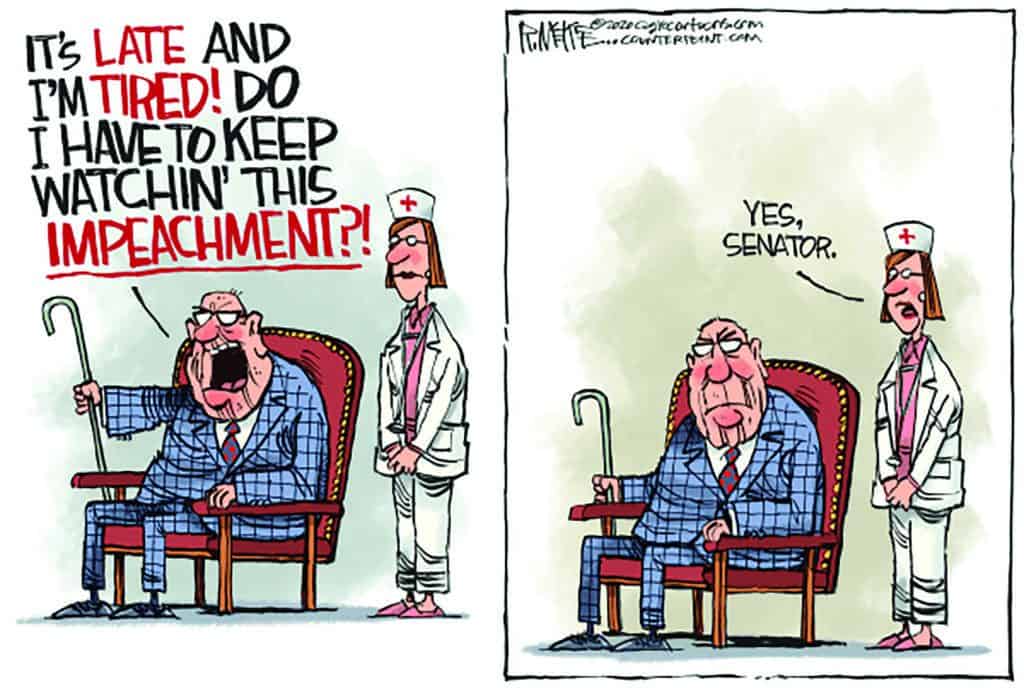
By Patrick Leahy
Hours before senators were sworn in to serve on President Trump’s impeachment trial, an independent, nonpartisan government watchdog confirmed what I have long suspected: When Trump froze congressionally appropriated military aid to Ukraine as part of an effort to compel Ukraine to investigate his political rival, he broke the law.
That’s because a central feature of our republic, defined by its separation of powers among the three branches of government, is that Congress, not the president, controls the “power of the purse.” James Madison argued that this was “the most complete and effectual weapon” to counter “all the overgrown prerogatives of the other branches.” The nation’s founders enshrined their vision in Article 1, Section 9 of the Constitution, establishing that Congress alone possesses the power of the purse. The president can propose funding for whatever projects he wants, but Congress ultimately decides where to direct the American people’s tax dollars.
Nearly 200 years later, in 1974, Congress overwhelmingly enacted the Impoundment Control Act (ICA) in response to President Richard M. Nixon’s overreach into Congress’s appropriations power. The ICA grants presidents limited ability to cut or delay any spending appropriated by Congress. If presidents wish not to spend appropriated money, they must seek and obtain Congress’s approval. Even a delay in spending requires notice to Congress.
On Thursday, Jan. 16, the nonpartisan Government Accountability Office concluded that, because the “Constitution grants the President no unilateral authority to withhold funds,” the administration “violated the ICA.” The GAO further found that the administration’s excuses for the president’s actions “have no basis in law.”
A violation of a law, by itself, is not necessarily sufficient to warrant impeachment and removal from office. The “high crimes and misdemeanors” required by the Constitution refer instead to misdeeds in high office — a “violation of some public trust,” according to Alexander Hamilton — which need not be criminal. It is now the Senate’s responsibility to decide whether the president abused the powers of his office for personal gain when he withheld congressionally appropriated funds from an ally in violation of the Impoundment Control Act.
In fiscal 2019, Congress appropriated $250 million in military assistance for Ukraine, a U.S. ally, through the Defense Department, and Trump signed that assistance into law. Russian-backed forces invaded Ukraine in 2014, forcibly annexing Crimea. Approximately 13,000 people have since been killed, and more than 1.5 million displaced.
The Pentagon strongly supported the military assistance and certified last spring that Ukraine had implemented anti-corruption measures required by Congress as a condition of the aid. But the president secretly froze the aid two months later, over warnings from Defense Department officials that doing so risked violating the ICA, while the president and his associates pressed Ukraine to launch baseless investigations that would help him politically. The president released the aid in September — after he got caught.
In my 43 years on the Senate Appropriations Committee, where I now serve as vice chairman, I have never seen anything like it.
Senior White House aides, such as budget official Michael Duffey and acting White House chief of staff Mick Mulvaney, could tell us exactly what happened, but Trump directed them not to testify before the House. The Senate must insist on hearing from these and other key witnesses.
If Trump disagreed with Congress’s appropriation, he could have vetoed the bill. He did not. Thereafter, he could have proposed a “rescission” to block the aid under the ICA, which requires congressional approval. He did not. Or, with congressional notification, he could have deferred the funds — but only for specific reasons under the Impoundment Control Act that the GAO found did not apply. He did not attempt this either. As the GAO opinion makes clear, the president chose a fourth option, one that violated the law.
The ICA is not just a technical appropriations law. It reinforces the control over taxpayer dollars the Constitution reserved for Congress. Having won independence from a monarchy, the framers feared an unchecked executive with the power to use public dollars as a slush fund for his personal interests. After all, if the president can interpose his personal interests between congressional appropriations and a designated funding recipient, such as Ukraine, what would stop him from withholding development funds intended for a U.S. city until the mayor endorses him? What stops him from holding any part of the $4.7 trillion annual federal budget hostage to his personal whims?
Congress chose to provide military assistance to an ally that is literally under attack by Russia. The president chose to delay that aid, violating the law, because he viewed his political interests as more important.
Each senator has sworn an oath to defend the Constitution. And on Thursday we took yet another oath to do “impartial justice according to the Constitution.” Will the Senate now defend the Constitution’s carefully balanced separation of powers? How we answer this and other critical questions in the coming weeks will define America’s democracy for generations to come.
Leahy is a Democrat U.S. senator. He is vice chairman of the Appropriations Committee. This piece was published n the Washington Post Jan. 17.




